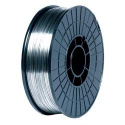|
I'm currently doing a manufacturing engineering degree and it's shaping up to be more of a maintenance/mechanical engineering degree than I thought. I might stop at AS and switch into Mechanical engineering simply because I really like physics. But I've got a pretty good background with CAD/CAM Mastercam, Solidworks, and blueprint reading/design. I'm just bad with understanding abstract mathematic concepts (hence the custom title). which may be my downfall in more advanced schools than a community college. P.S. Is it unrealistic for someone with mediocre grades in HS, a 3.5-ish GPA for an engineering AS, and a little bit of trade background in high school to get into say... MIT?
|
|
|
|

|
| # ? May 16, 2024 08:23 |
|
yeah, but you can get a good education elsewhere anyway. If you can get through differential equations, none of the math I've used so far is nearly as abstract as that (in MechE).
|
|
|
|
So how hard is the FE anyway? I'm getting my BS in Mechanical Engineering in January and I plan on taking the FE pretty soon.
|
|
|
|
Hi goons, chemical engineer here, graduated in May and now working for a large oil and gas company in the US. I'm willing to answer any questions you have about what it's like in the first 6 months, what to expect, how to roll ... whatever you like!Muir posted:I took a LabVIEW class in the applied physics department here over the summer and I used Hands On Introduction to LabVIEW for Scientist and Engineers. It was a really good book, having you work through exercises as the chapter goes on, and then gives you problems to do at the end of each chapter. A friend of mine likes LabVIEW for Everyone: Graphical Programming Made Easy and Fun but I've never used it. Man, I came to this thread with the intention of asking about LabVIEW and here was my answer. THANKS SO MUCH! I'll look into those.
|
|
|
|
illcendiary posted:So how hard is the FE anyway? I'm getting my BS in Mechanical Engineering in January and I plan on taking the FE pretty soon. No individual question is hard, its the breadth and length of the exam that can get to you.
|
|
|
|
hobbesmaster posted:No individual question is hard, its the breadth and length of the exam that can get to you. Yeah, the fact that everyone takes the same test means you have to cover everything including stress tensors, electrical circuit analysis, chemical reaction kinetics, steel composition, etc... There's plenty of questions that are completely unrelated to your chosen specialization, so you'll have to pick the basics up of everything else. Its not a bad thing IMO, since the test IS about the "Fundamentals of Engineering". That said, the pass rate is pretty high. If you browse one of those FE study books at the bookstore you'll get an idea of what to expect, and then you can study to cover the gaps in your knowledge. Just don't go into the test cold and get blindsided by stuff you didn't cover. Time can definitely be a factor, so skip the questions you get hung up on and go back to them later if you finish everything else.
|
|
|
|
Is there a reason you need to be tested on material totally unrelated to your specialty to be licensed in america? It seems strange to me.
|
|
|
|
slorb posted:Is there a reason you need to be tested on material totally unrelated to your specialty to be licensed in america? It seems strange to me. The actual PE exam is restricted to each specific discipline and is open book. And much much harder.
|
|
|
|
Jesschen posted:Hi goons, chemical engineer here, graduated in May and now working for a large oil and gas company in the US. I'm willing to answer any questions you have about what it's like in the first 6 months, what to expect, how to roll ... whatever you like! Well, what's the typical work done, are you messing with pipes and reactors, or doing chemistry? What do you do most of the day - stare at data on a computer? And if so, what? How easy/hard was it to find a job doing chem e, btw?
|
|
|
|
I remember back in like 96 my dad got his PE in nuclear and all that changed was he could call his firm an "engineering firm" and not a "consulting firm." his work or income remained unchanged
|
|
|
|
|
slorb posted:Is there a reason you need to be tested on material totally unrelated to your specialty to be licensed in america? It seems strange to me. I believe the logic is that engineering is so cross discipline that as a professional engineer you need at least a cursory knowledge of stuff outside your field so you know what you don't know.
|
|
|
|
slorb posted:Is there a reason you need to be tested on material totally unrelated to your specialty to be licensed in america? It seems strange to me. Like others said this is just the first step. You take this 8 hour test at the end of school and it basically proves you have studied the required engineering classes and can think and work like an engineer. The test is easy. Just buy the study book and go over the whole thing. I suggest taking the specific test in the afternoon. You just studied all of it in school so it is fresh, you don't remember some random calc 3 stuff. Two type of people fail this test. Idiots who really shouldn't pass and are bad engineers (you all know people like this) and people who are smart but don't review and study and are blown away by the content and time constraint. (ftr I studied and finished both tests in 2:30min)
|
|
|
|
Nihilanthic posted:Well, what's the typical work done, are you messing with pipes and reactors, or doing chemistry? What do you do most of the day - stare at data on a computer? And if so, what? It was fairly difficult, especially right now with the economy so low. In this case, it was really a situation of "who I knew," not necessarily "what I knew." I qualified for a bunch of the jobs I applied for, but only got an interview because someone put in a good word. Don't let that discourage you, though. Send your resume to EVERYONE you can think of, every company you can imagine. Just don't stop sending it out, and don't stop applying. It's grueling but it will eventually get you somewhere. I actually do a lot of design work for lab-scale models of machinery and testing equipment. I've helped build a device for the use of testing different catalysts in mini-reactors. Granted I was incredibly overwhelmed at first -- most the stuff you learn in school is large-scale industrial equipment, and everything here was teeny tiny (5-6 mm diameter pipes?! wat!). But it has been grand fun so far. They're moving me to another department soon to work on testing their spectroscopy equipment (NMR, FTIR, XPS mostly) and it sounds like it might be a bit more boring than this fun design stuff. But, hey, whatever pays the bills. I do a lot of desk jockeying, a lot of data entry, a lot of data review, a ton of looking over P&IDs and diagrams. And safety. Safety training for this, that, you name it. It's a huge, huge, HUGE deal. Bigger than they ever tell you in school.
|
|
|
|
Jesschen posted:I do a lot of desk jockeying, a lot of data entry, a lot of data review, a ton of looking over P&IDs and diagrams. And safety. Safety training for this, that, you name it. It's a huge, huge, HUGE deal. Bigger than they ever tell you in school. Want to reset a tripped 20A breaker? Better be wearing cotton flame-resistant clothes, goggles, leather gloves and a hard hat if you don't want to die!
|
|
|
|
Colmface posted:I ended up getting an internship with ABB in Switzerland, which is really exciting. Tell me more! (your background, the process etc.) I'm interested in working for ABB in the future. I'll be starting my Masters next year, I've just finished my 4 year B.E. in electrical engineering (alllllmost top of my class  ) )I've got a really cool job for the summer designing a hybrid DSP/FPGA-based controller for an electric car. I want to do research in power electronics and control theory for my Masters.
|
|
|
|
catbread.jpg posted:Tell me more! (your background, the process etc.) I'm only in my third year of an undergrad in EE. There wasn't really a process, I was just offered a job. My school has developed strong ties with ABB and Alstom for their internship program (which is done after third year), and I applied for a bunch of the postings. Like I said, there was no process. The person who will be my supervisor just e-mailed me saying "I want you for the job."
|
|
|
|
Jesschen posted:Hi goons, chemical engineer here, graduated in May and now working for a large oil and gas company in the US. I'm willing to answer any questions you have about what it's like in the first 6 months, what to expect, how to roll ... whatever you like! Did you Co-Op? Also, what was the ChemE program like where you went? I'm at Mississippi State and will probably be switching to ChemE next semester so it'd be cool to have a rough idea of what it's like and what to expect.
|
|
|
|
grover posted:Safety is out of control all other the place, often to the point of stupidity. The real shame is that the net result is that the truly important things are ignored. Having been shocked by stripped extension cords, sprayed with fire extinguishers, welded in tanks and had my foot (steel instep, thankfully) ran over by golf carts, I can tell you it is a definite and dire need, though they tend to just put effort into the place where its... the easiest to enforce, not necessarily where its needed the most. Anyway, do you mean a 20A breaker like what would be in my house if I ran my microwave at the same time as my toaster or something? LOL.
|
|
|
|
When you take the FE they give you a ridiculously comprehensive booklet full of engineering equations and tables. When you get to the questions on electricity, immediately flip to the section of the notebook on electricity. This makes it much easier for you. For some reason, when I took the test, everyone around me seemed to avoid using the massive cheat sheet they we were supplied with. I graduated with a B.S. in Chemical Engineering and could not find a job to save my loving life. Or more specifically, none of the big companies with high-paying jobs that I thought I deserved would even interview me. This was because 1) I honestly believed that "GPA doesn't matter for ChemE's, we're in such high demand!!!" 2) I had zero internships or work experience of any kind. I got out in four years flat. So instead I went to grad school and am now having the time of my life getting a PhD in Petroleum Engineering, which is much cooler than I ever would have imagined. Getting a PhD allowed me to become much more technically savvy in both breadth and depth, get a "second chance" at a good GPA, and most importantly form a solid network with some big-name professors and use that to land some excellent internships. I guess I come off as recommending grad school here. Frankly, I do recommend it. 80% of the managers in respectable companies seem to have an M.S. A disproportionate number of executives have PhDs. I guess a B.S. is fine if you're fine making "enough" money but if you have an ambition of really being an industry leader I'd go for grad school. Grad school is usually free, i.e. they pay your tuition and a decent stipend.
|
|
|
|
Nihilanthic posted:Anyway, do you mean a 20A breaker like what would be in my house if I ran my microwave at the same time as my toaster or something? LOL.
|
|
|
|
Traitorous Leopard posted:Did you Co-Op? Also, what was the ChemE program like where you went? I'm at Mississippi State and will probably be switching to ChemE next semester so it'd be cool to have a rough idea of what it's like and what to expect. Yes, I co-op'ed and I would HIGHLY suggest anyone do the same. It may set you back from graduating on the "four year plan", but you graduate with a year of experience under your belt and the knowledge is invaluable. What you learn in class becomes vibrantly illustrated in a real-life setting. And, sometimes, you learn more than you ever expected to by getting hands-on experience. The ChemE program there is good but I encourage you to get involved with everyone in your classes. The community that hung out and studied/worked/networked in the Swalm lounge was an asset. Also, talk to the professors there. They're friendly and pretty down to earth. It is very rough though. Prepare for long sleepless nights, weeks, months. Be thankful the Swalm lounge is so comfy. They have a set style that they want you to submit assignments in and if you don't follow through, you'll lose grades fast. Also, go to EVERY ChemE class, everyday. Skip the others if you feel inclined, but don't miss the core ones. They pick up super fast and you will be super lost mid-semester if you missed a few days at the beginning.
|
|
|
|
Hello! I'm studying aerospace engineering in the UK. I'm currently in second year. Last year I did an internship with the Ministry of Defence, which was really poo poo. It was incredibly boring office work. I don't think I really learned anything technical. Turns out the MoD likes to hire engineers so that they don't get the wool pulled over their eyes by contractors. They do, however, refuse to do any work in house, so the engineers they hire don't really do much. After spending my summer as the risk manager (for a risk register that was ignored the few times they might have referenced it), I've been looking elsewhere for more interesting stuff. The idea of working in Canada appeals to me. I'm half Canadian and have citizenship, so there isn't any legal difficulties. There's a few different "Placements abroad" organisations which I'm aware of. IAESTE tend to do more placements with governmental organisations. AIESEC have other placements, but they're more generic (non engineering) ones. I've looked at a few companies that could be interesting, but most of them seem to have university-based application processes for internships. I emailed one or two, but didn't receive any reply. I'm sure they're not really interested, if they even manually monitor their recruitment email addresses for stuff that isn't CV's. I'm aware of a lot of different internships and placements in the UK, and I'm sure there's a similar number in Canada. However, without a university to go to for these things, it's quite hard to find them. Can anyone give me any advice? Know any lists of these things? Thanks!
|
|
|
|
Jesschen posted:Yes, I co-op'ed and I would HIGHLY suggest anyone do the same. It may set you back from graduating on the "four year plan", but you graduate with a year of experience under your belt and the knowledge is invaluable. What you learn in class becomes vibrantly illustrated in a real-life setting. And, sometimes, you learn more than you ever expected to by getting hands-on experience. I completely agree with this. Also there is the option of finding summer internships. You can work for 4 months and then be right back to school. I did two back when I was in school and ended up with 4 offers and 3 turned down office interviews (this was fall of 08...aka the beginning of the end of the economy). You are a fool not to do a co-op/internship. Also there is *no way* to get done in 4 years where I went to school. Need 133 credits (16.625 credits a semester...F that!). So you might as well slow down and intern/co-op.
|
|
|
|
spwrozek posted:Also there is *no way* to get done in 4 years where I went to school. Need 133 credits (16.625 credits a semester...F that!). So you might as well slow down and intern/co-op. Yeah, take it easy. Breaking your neck to try and get it done in 4 years is just ... not worth it, I think. You might, by some miracle, manage to cram all that learnin' in with a co-op position, but you don't want to burn out. I had too many friends that managed to get to their senior year and then just collapse and have to withdraw due to mental/emotional/psychological exhaustion. Now I have some questions to ask the experienced goon-gineers! My work focus is about to switch to a TON of technical writing and instructional work. They found out I have a strong background in tech. writing/English/creative writing and it looks like I'll be doing a long-term project of fixing and writing instructional manuals for operational manufacturing and training. Are there any must-have handbooks or references you guys use for tech writing that I could get a hold of and start looking at to refresh my memory and skills? Any sort of formats I should be aware of/start learning? Also, any quick remedies for aching hands? I'm a good typist (110-120 wpm), have good ergo while typing, and rarely have hand pain after a long day of coding/data entry. Still, I want to be prepared for the job switch.
|
|
|
|
Jesschen posted:Also, any quick remedies for aching hands? I'm a good typist (110-120 wpm), have good ergo while typing, and rarely have hand pain after a long day of coding/data entry. Still, I want to be prepared for the job switch. Exercise, relaxation, eat well, probably "RICE" on your forearms and hands. Strength training is probably in your best interest, too, IMO. I found my hands/wrists/forearms were better after getting much higher grip strength when I did metal working last year and over the summer of this year, yet still played video gapes and came here when I was not at work.
|
|
|
|
On another note, is it possible to find a co-op or internship while in a community college getting an AA before you transfer to a university? Or would I have to wait until then? I'm going 100% all out into this and by no means want to let overlooking a detail such as that screw over my job prospects when I graduate!
|
|
|
|
Nihilanthic posted:On another note, is it possible to find a co-op or internship while in a community college getting an AA before you transfer to a university? Or would I have to wait until then? It's a lot harder, but it can be done. The major obstacle is that, unless your CC has a lot of transferable core engineering classes (mine had none), then you won't really have enough knowledge to apply to most internships. One thing that would help a lot is if you are able to work on some technical projects at school. I managed to land an internship at an aerospace component manufacturer while I was at CC after co-founding a robotics club on campus which then competed in a national robotics competition. A couple of my teammates were also offered internships just from their exposure on that project. On the other hand, I don't think you have to worry about screwing up your job prospects by not having an internship at CC. As long as you get in one Summer internship while you are at the university, you should be in good shape.
|
|
|
|
Calef posted:When you take the FE they give you a ridiculously comprehensive booklet full of engineering equations and tables. When you get to the questions on electricity, immediately flip to the section of the notebook on electricity. This makes it much easier for you. For some reason, when I took the test, everyone around me seemed to avoid using the massive cheat sheet they we were supplied with. This is what I don't get about the FE. As far as I can tell, based on the sample problems I've seen and the massive booklet they provide, it's more a matter of being able to find equations in books than actually recalling learned stuff. I guess if you already know something, you just finish faster than normal. Anyway, was there a gap between your graduation and applying to grad school? I am thinking of getting a Masters in Petroleum Engineering, but I think there will be a six-month gap or so between graduation and the start of grad school. I'm pretty much in what your shoes once appeared to be. Gonna graduate in January with so few job prospects it's dizzying. I've already interviewed at several oil companies around here and been turned down, so I don't really know what to do. Thing is, I have a 3.6 GPA and previous intership experience (albeit only one summer's worth). All I know is that come January, I'll have a BS from a top-20 school, and my parents will have wasted all sorts of money and I'll be unemployed and oh god
|
|
|
|
illcendiary posted:I'm pretty much in what your shoes once appeared to be. Gonna graduate in January with so few job prospects it's dizzying. I've already interviewed at several oil companies around here and been turned down, so I don't really know what to do. Thing is, I have a 3.6 GPA and previous intership experience (albeit only one summer's worth). All I know is that come January, I'll have a BS from a top-20 school, and my parents will have wasted all sorts of money and I'll be unemployed and oh god If you REALLY want to work, keep trying to find work. The economy sucks bad right now but I guarantee you that if you keep your head up and just apply, apply, apply, you will get something, somewhere. I apologize if you've heard people say this over and over again and it sounds like a broken record, but it's really the best advice I was given when I was in your shoes (about to graduate, high GPA, work experience, NO JOBS OH GOD NOOO). Tap all your resources -- ask friends, ask family, ask family friends. A good word goes a long way, and you're lucky to have some internship experience. It helps -- even though I also only had a summer's worth of experience, it looks good on a resume and gave me something to talk about in the interview to hook the company. And whatever you do -- don't stop applying. Keep sending your resume out to everything you can find/think of. And, as for grad school ... A lot of people I graduated with gave up and went back to grad school since they had no options in the job market, and while some of them are really loving it, a lot of them are starting to voice regret. They graduated WANTING to work, and now they feel like they're trapping themselves. To me, grad school is one of those things that I feel like you should go and do when it's best for you, not just when it's "an option because I can't find work." But that's just me. I considered grad school very heavily for a while before I decided to just suck it up and desperate apply for jobs, but I opted out because I really just wanted to work. I was so drat tired of school. I'll send enthusiastic engineering thoughts your way, illcendiary, for whichever path you take! AFK SWARM OF BEES fucked around with this message at 15:27 on Dec 10, 2009 |
|
|
|
Chemical Engineer here. Joined a engineering contractor straight out of uni, I've mainly been working on Ethylene technology since I arrived at the company. Work at this place is a world away from uni, I can think of maybe 3/4 modules and my design project which actually have any common ground with what you'd actually be doing day to day. My work mainly consists of i) PID Development, basically a drawing of all lines, instruments, pieces of equipment that will actually be built at plant ii) Fluid Systems work, i.e. how big do the lines have to be, what size PSV is required to protect a vessel from any number of overpressure cases (i.e. dim operator closes the outlet valve, external fire etc.) iii) Process Development, this is where we get to the nitty gritty of how we get the plant to work, how many theoretical stages do we need to perform a certain separation, essentially a simulation of how the plant will (hopefully!) work. With 18 months of this under my belt I came out to the paradise that is Saudi Arabia, where I've been for the last 6 months. It really is an eye opener seeing A3 drawings being translated into gargantuous pieces of equipment (tallest distillation column in East Saudi at 115m) and has given me a greater appreciation of what plants actually look like/start up. If you ever get a chance to go to site i'd recomment it (hopefully it will be a nicer place than KSA!)
|
|
|
|
AllAmericanAndy posted:Chemical Engineer here. Joined a engineering contractor straight out of uni, I've mainly been working on Ethylene technology since I arrived at the company. Oh boy pipes I sure love me some pipes. Not really they're a bitch to weld. Don't put any weldments near something that would make it hard to get to the joints or someone will curse your name  Dumb question - why do you need a chemical engineer to spec pipes, why isn't that more generalized or something that, say, an ME could do? Are there further details I'm not aware of or is it just becuase you're also doing the chemistry for it? To be a little more focused, where does chemical engineering start and ME/Chemistry end? BTW How is Al Baik?
|
|
|
|
Nihilanthic posted:Oh boy pipes I sure love me some pipes. Not really they're a bitch to weld. Don't put any weldments near something that would make it hard to get to the joints or someone will curse your name To answer your first question, the size of the pipe dictates the amount of pressure drop you will have for a given flow, small pipe big presure drop, big pipe low pressure drop. Over time contractors develop their own 'optimum' velocity for fluid flow (though this will differ, it is low for pipe suction, high for pipe discharge, low for low pressure systems etc.) therefore as part of the systems design we have to look at the simulation, get fluid properties etc. and determine the best pipe size. This optimum velocity is basically a balance between capital cost vs. operating cost. The chemical in chemical engineering is a bit of a misnomer I did very little chemistry at uni. Basically the bread and butter of chemical engineer is developing processes to change raw feed into valuable products and working out what equipment is needed (so be it distillation columns, heat exchangers, mixers etc.) and what systems are required to allow the process to operate safely etc. This vary from the huge scale of petrochemical/refinery to fine chemical as pharmaceuticals. But common to both are topics such as reactor behaviour, separations, heat exchange and various other topics
|
|
|
|
AllAmericanAndy posted:To answer your first question, the size of the pipe dictates the amount of pressure drop you will have for a given flow, small pipe big presure drop, big pipe low pressure drop. Over time contractors develop their own 'optimum' velocity for fluid flow (though this will differ, it is low for pipe suction, high for pipe discharge, low for low pressure systems etc.) therefore as part of the systems design we have to look at the simulation, get fluid properties etc. and determine the best pipe size. This optimum velocity is basically a balance between capital cost vs. operating cost. That makes it seem more like a subset of M.E. than applied chemistry, which the name implied. Still, cool beans! Pretty interesting... but now I wonder, how many ME's do ChemE? I know of a recent (well, at the time he spoke of it) M.E. grad making heat exchangers for some refinery and being quite well compensated for making what he called 'gigantic radiators'.
|
|
|
|
Nihilanthic posted:That makes it seem more like a subset of M.E. than applied chemistry, which the name implied. Chemical engineering is first and foremost engineering, not chemistry (it's called chemical engineering because originally it was the study of any and all engineering relating to chemical production processes). As such, there is a lot of overlap between chemical and mechanical engineering: fluid mechanics, heat transfer, and thermodynamics primarily. However, ChE and ME have their own approaches to and spins on these subjects, as well as their own fields that the other doesn't address (reaction engineering and mass transfer for ChE, statics, dynamics, and materials for ME come to mind as examples). So yes, it's not unheard of to have a job like pipe design and engineering that is within the purview of both ChE and ME. But there's a lot of ChE besides that stuff, and we're certainly not a subset of ME.
|
|
|
|
I have a B.Sc in Engineering-Physics. I'm in an economics PhD program, and about a semester away from getting my masters degree. If I decided to leave grad-school with just the masters, what would my career options in engineering look like? Would an economics degree be largely useless, or would it be helpful in consulting or something?
|
|
|
|
falcon2424 posted:I have a B.Sc in Engineering-Physics. I'm in an economics PhD program, and about a semester away from getting my masters degree.
|
|
|
|
Just throwing this out there: you should check course titles and course descriptions of your degree. I went into environmental engineering thinking I would be doing things like waste water treatment/ air quality control/ civil engineering stuff. Turns out at my university it's more like a mechanical engineering degree with a focus on renewable energy + elements of mech. eng. like thermodynamics and fluids. It's strange really, I don't know why it's called environmental engineering when it's nothing like most descriptions of it I've read are. edit: Yeah, I figure this thread is a good place to ask as any. If someone has time, please consider looking at my degree description and descriptions of the upper division courses I have to take. I feel a little insecure about the program and it potentially being a gimped degree because it's relatively new (five years old). Right now I'm interested in zero energy buildings and the design philosophy behind them in addition to the analysis behind it. I understand this might be more architectural than engineering. I'm also currently trying to learn a few programming languages on my own. At this point, I can still bail out of the degree and go straight up for a pure mechanical engineering degree, but after next quarter I pretty much run out of options if I want to graduate in four years. bjobjoli fucked around with this message at 03:21 on Dec 14, 2009 |
|
|
|
Cypress posted:I had a question for Canadian Engineering Goons. Hello! I just applied to get my P.Eng in Ontario, so I've got some background knowledge about Canadian P.Eng stuff. Most Provinces allow a certain amount of work during schooling to count towards your work experience. In Ontario, you are allowed to count up to 8 months in the last two years of University. I would certainly check in with the OIQ to see what counts. Transfers between Provinces doesn't seem to be that hard. I know that my bosses just have to apply and wait for the paperwork. Although they do have quite a number of years experience. The big thing is to be aware of the governing codes in your line of work that each Provence uses. I do know that Engineer's Canada (the "parent body" of all the Provincial organizations) is working to stream line the licensing requirements between the Provinces. I'm a structural/geotechnical engineer, so I'm not sure about the ins and outs for computer engineering. My impression from friends who have graduated with that degree is that the P.Eng license isn't really required. I could be very wrong though :P. When you do apply, get ready for a hell of a lot of paperwork. Also, if anyone has any questions about civil or geotechnical engineering, or P.Eng licensing in Ontario, I can try to help out. I've got 3.5 years experience in shoring and deep foundations, and am currently back in school doing a Masters.
|
|
|
|
Muir posted:Chemical engineering is first and foremost engineering, not chemistry (it's called chemical engineering because originally it was the study of any and all engineering relating to chemical production processes). As such, there is a lot of overlap between chemical and mechanical engineering: fluid mechanics, heat transfer, and thermodynamics primarily. However, ChE and ME have their own approaches to and spins on these subjects, as well as their own fields that the other doesn't address (reaction engineering and mass transfer for ChE, statics, dynamics, and materials for ME come to mind as examples). MechE thermo classes usually don't even go into phase transitions, which is the best part of the class. Still, due to my lack of ME classes like statics and dynamics I don't really feel like a 'real' engineer despite my degrees in ChE.
|
|
|
|

|
| # ? May 16, 2024 08:23 |
|
Pfirti86 posted:MechE thermo classes usually don't even go into phase transitions, which is the best part of the class. Still, due to my lack of ME classes like statics and dynamics I don't really feel like a 'real' engineer despite my degrees in ChE. Don't let the MEs define engineering for you. We do our things, they do theirs, and it's all engineering. Leave the feeling insecure about your engineer status to the BMEs.
|
|
|
























